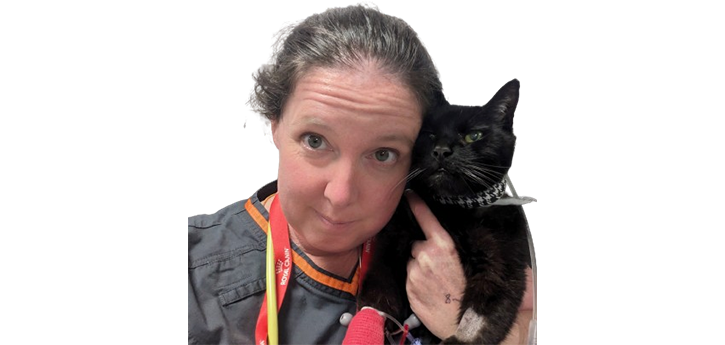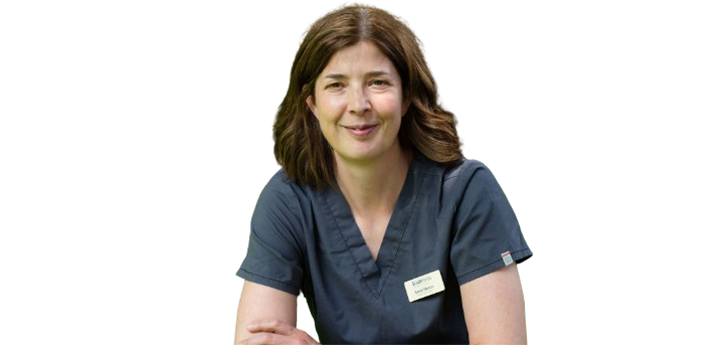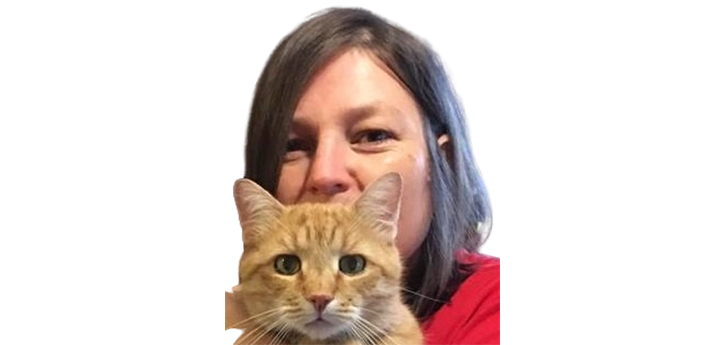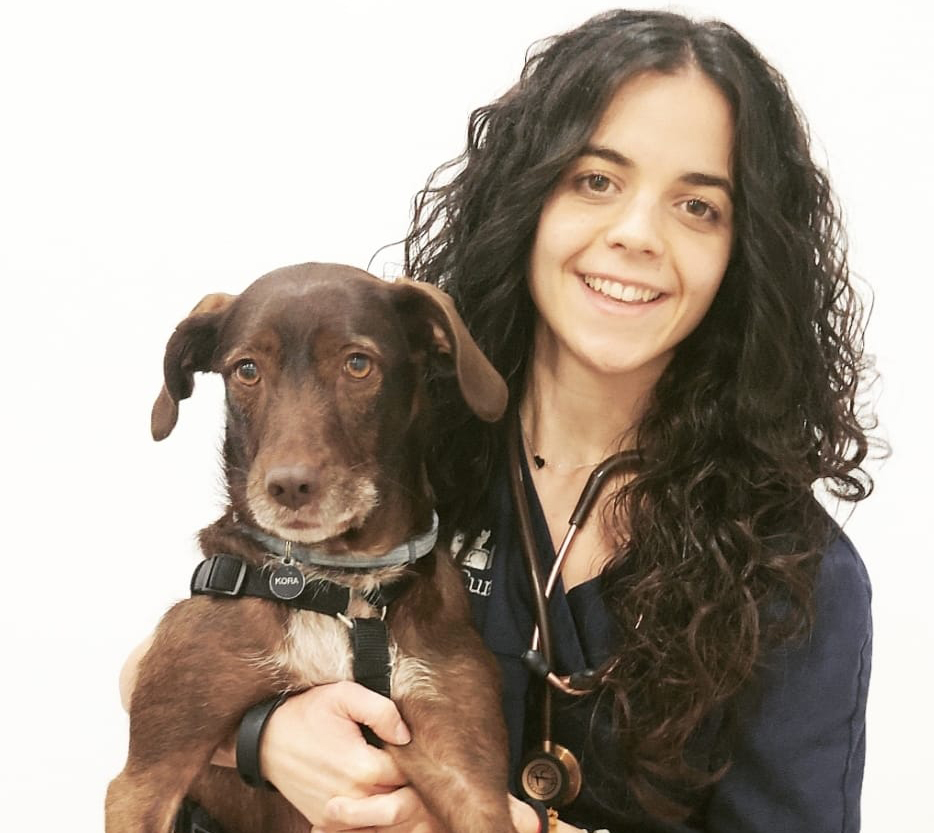Postgraduate in Small Animal Internal Medicine
Obtain your credential - PgCert. Int. Med. ifevet
Postgraduate in Small Animal Internal Medicine
Obtain your credential - PgCert. Int. Med. ifevet
Start date
4th April 2026
Timetable
Saturday from 9:00 to 18:30 Sunday from 9:00 to 14:30
ECTS Credits
30 ECTS credits
Number of modules
12 modules
Modality
Streaming
Number of students
36 students
Start date
4th April 2026
Timetable
Saturday, 9 to 18:30 Sunday, 9 to 14:30
ECTS Credits
30 ECTS credits
Modules
12 modules
Places
36 places
Number of students
36 students
- Description
- Speakers
- Programme
- Pricing
Certification obtained
After passing the postgraduate university training, you will be able to obtain the following credentials to use in your CV:
• International Credential: PgCert. Int. Med. ifevet
• Certification obtained: Postgraduate Certificate in Small Animal Internal Medicine (ifevet)
Course Objective
The course aims to provide candidates with the knowledge and skills required to confidently manage common small animal medicine cases in general practice.
Structure and benefits of the postgraduate programme
The postgraduate program comprises twelve modules spanning a broad range of topics in small animal internal medicine. Each module will be taught by one or several specialists certified in their respective fields to ensure the highest quality training.
At the end of each module, candidates will gain comprehensive knowledge enabling them to approach a medicine case with confidence.
Target Audience
Designed for professionals working in general practice, this programme aims to deepen their knowledge in this specialty, update their skills, and provide cutting-edge information, all of which will be applicable to daily practice.
This postgraduate programme will be highly beneficial for clinicians with some experience in internal medicine, as well as for beginners needing a clear grasp of fundamental concepts from the outset.

Jennifer Raj
BVetMed, DipECVIM-CA MRCVS, RCVS Specialist in Small Animal Internal Medicine, EBVS® Specialist in Small Animal Internal Medicine | | Director of Internal Medicine Postgraduate course


Andrew Kent
BVSc DipECVIM-CA, MRCVS, EBVS®European and RCVS Specialist in Small Animal Internal Medicine

Xavi Navarro
LV, Dipl. ECVIM – CA (Cardiology), EBVS®European Specialist in Small Animal cardiology

Sarah Mason
Dip ECVIM-Ca (onc), EBVS® European Specialist in Oncology and Radiation Oncology

Raquel del Solar Bravo
MRCVS, Dip.ECVIM-CA, EBVS® Specialist in Small Animal Internal Medicine

Petros Frezoulis
RCVS and EBVS® European Veterinary Specialist in Small Animal Oncology, DVM, MSc, DipECVIM-CA (Oncology), MRCVS Director of postgraduate Oncology course



Friederike Rau
Dr.med.vet. DVM, MRCVS, DipECVDI, EBVS® European and RCVS Specialist in Veterinary Diagnostic imaging, German Specialist in Veterinary Diagnostic Imaging

Oriol Jornet Rius
LV., MRCVS, Dipl. ECVCP, EBVS Especialista europeo en Patología Clínica Veterinaria
Date: 4th April 2026
Modality: Streaming
Competencies and objectives:
- Know how to logically approach a medicine case, form an appropriate problem and differential diagnoses list, and devise a suitable investigative plan.
- Know how to logically interpret routine laboratory tests including haematology, biochemistry, urinalysis and basic cytology.
- Gain confidence in using and interpreting diagnostic imaging in practice.
- Learn skills to help you keep up-to-date; review scientific literature and become an independent learner.
Module Summary:
- Getting things right from the beginning: how to approach the medicine case.
- Interpreting haematology, biochemistry and urinalysis.
- Cytology in practice.
- Thoracic and abdominal radiography; tips for confident interpretation in practice.
- Making the most of ultrasound in practice.
- Future proof yourself! How to become an independent learne.
Speaker: Jennifer Raj, Oriol Jornet, Friederike Rau
Date: 5th April 2026
Modality: Streaming
Competencies and objectives:
- Know how to investigate and treat an anaemic patient.
- Understand how to diagnose and treat different bleeding disorders.
- Know the principles of transfusion medicine and be able to apply this to clinical practice.
- Understand how to diagnose and treat common immune mediated diseases of the dog and cat.
- Understanding and using immunosuppressive medications.
- Know how to logically approach a pyrexic patient.
Module Summary:
- Regenerative and non-regenerative anaemia.
- Understand bleeding disorders, diagnostic tests and treatment.
- Understand the principles of transfusion medicine and be able to apply this to clinical practice.
- Immune mediated diseases of the dog and cat.
- Understanding and using immunosuppressive medications.
- A logical approach to the pyrexic patient.
Speaker: Rachel Miller, Jennifer Raj
Date: 2nd May 2026
Modality: Streaming
Competencies and objectives:
- Understand normal physiology of the gastrointestinal tract.
- Know how to approach and treat the acute and chronic gastrointestinal case.
- Oesophageal disease; know how to investigate and treat the regurgitating patient.
- Understand the rational use of therapeutics in gastrointestinal disease.
- Know how to logically investigate a patient with unexplained weight loss.
Module Summary:
- A logical approach to the acute gastrointestinal case.
- Investigating and treating chronic gastrointestinal diseases.
- Oesophageal disease; know how to investigate and treat the regurgitating patient.
- Know how to rationally use therapeutics in gastrointestinal disease.
- Investigating unexplained weight loss.
Speaker: Mellora Sharman, Jennifer Raj
Date: 3rd May 2026
Modality: Streaming
Competencies and objectives:
- Canine chronic hepatic disease – logical investigation including interpreting diagnostic tests and how and when to obtain hepatic biopsies.
- Diagnosis and management of acute liver injury and hepatic encephalopathy in practice.
- Understanding the pathophysiology, diagnosis and treatment of canine and feline hepatic, biliary and pancreatic idease. feline cholangitis.
- Pancreatic disorders.
- Nutritional support for the sick patient in practice.
Module Summary:
- Investigating and treating canine hepatic disease: how to interpret laboratory tests and how and when to collect hepatic tissue samples.
- Diagnosis and management of acute liver injury and hepatic encephalopathy in practice.
- Disorders of the biliary tract.
- Pancreatic disorders.
- Nutritional support for the sick patient in practice.
Speaker: Mellora Sharman, Jennifer Raj, Marisa Lourenço
Date: 13th June 2026
Modality: Streaming
Competencies and objectives:
- Know how to perform a full assessment of the cardiovascular system. Understand the origin of different heart murmurs.
- Confidently diagnose and treat canine congestive heart failure in practice.
- Know how to manage feline cardiomyopathies.
- Understand the normal ECG and how to diagnose and manage common arrhythmias.
- Know how to diagnose and manage hypertension.
- How to approach a case with episodic weakness and collapse; cardiac, medical and neurological perspectives.
Module Summary:
- Know how to perform a full assessment of the cardiovascular system. Understand the origin of different heart murmurs.
- Diagnosis and treatment of canine congestive heart failure.
- How to manage feline cardiomyopathies.
- Understand the normal ECG and how to diagnose and manage common arrhythmias.
- Management of the hypertensive patient.
- How to approach a case with episodic weakness and collapse; cardiac, medical and neurological perspective.
Speaker: Xavi Navarro, Rachel Miller, Jennifer Raj
Date: 14th June 2026
Modality: Streaming
Competencies and objectives:
- Know how to clinically evaluate and use appropriate diagnostic tests to investigate abnormalities of the respiratory system.
- Know which infectious respiratory diseases affect dogs and cats.
- Know how to logically investigate, manage, and treat diseases of the pleural space.
- Understand what causes signs of nasal disease in dogs and cats; differential diagnoses, investigation, treatment and prognosis.
- Know how to diagnose, investigate and treat disorders of the upper and lower airway disorders.
- Pulmonary parenchymal diseases; aetiology, diagnosis, and treatment.
Module Summary:
- Clinical evaluation of the respiratory system.
- Infectious respiratory disease in dogs and cats.
- Investigation, management, and treatment of pleural space diseases.
- Nasal diseases in small animals; differential diagnoses, investigation, treatment and prognosis.
- Diagnosis and treatment of upper and lower airway disorders.
- Pulmonary parenchymal diseases; aetiology, diagnosis and treatment.
Speaker: Mellora Sharman, Raquel del Solar Bravo, Marisa Lourenço
Date: 11th July 2026
Modality: Streaming
Competencies and objectives:
- Know how to diagnose and treat common malignancies in practice including round cell tumours and mast cell disease.
- Know how to approach incidental masses, e.g. adrenal, hepatic and adrenal masses in practice.
- Understand how to rationally and safely use chemotherapeutics in practice.
- Client communication and long-term management of oncology patients.
- Learn about new developments in oncology, understand what treatment options are available to patients.
Module Summary:
- Diagnosis and treatment of round cell tumours.
- Managing mast cell disease in practice.
- Incidental splenic masses, hepatic and adrenal masses. What should I do?
- Using chemotherapy safely and effectively in general practice.
- Sarcomas; diagnosis and treatment.
Speaker: Sarah Mason, Petros Frezoulis
Date: 12th July 2026
Modality: Streaming
Competencies and objectives:
- Understand the principles Fluid therapy; making appropriate plans.
- Shock; causes and management.
- Interpreting blood gas analysis and acid base disorders.
- Diagnosing and managing electrolyte disorders in practice.
- Stabilising the dyspnoeic patient.
- Monitoring the critical patient.
Module Summary:
- Triage and monitoring the critical patient.
- Shock; causes and management.
- Fluid therapy; making appropriate plans.
- Interpreting blood gas analysis, acid base disorders.
- Diagnosing and managing electrolyte disorders in practice.
- Stabilising the dyspnoeic patien.
Speaker: Marisa Lourenço
Date: 12th September 2026
Modality: Streaming
Competencies and objectives:
- Know how to approach the patient with polyuria and polydipsia.
- Calcium disorders in dogs and cats.
- Management of diabetes mellitus in the dog and cat. Know how to troubleshoot the unstable patient.
- Management of diabetic ketoacidosis.
Module Summary:
- A logical approach to polyuria and polydipsia.
- Calcium disorders in dogs and cats.
- Management of diabetes mellitus in the dog and cat, including the unstable patient.
- Management of diabetic ketoacidosis.
- Insulinoma and emergency management of hypoglycaemia.
Speaker: Rachel Miller, Raquel del Solar Bravo
Date: 13th September 2026
Modality: Streaming
Competencies and objectives:
- Canine hypothyroidism – making a secure diagnosis, treatment and monitoring of this condition. Canine hyperthyroidism; causes and management.
- Understanding the treatment options of feline hyperthyroidism and what’s new in this area.
- Hyperadrenocorticism, diagnosis, treatment and monitoring in practice.
- Canine hypoadrenocorticism, when to test, diagnosis, treatment and monitoring plans.
- A guide to the less common endocrinopathies.
Module Summary:
- Canine hypothyroidism – making a secure diagnosis, treatment and monitoring of this condition. Canine hyperthyroidism; causes and management.
- Understanding the treatment options of feline hyperthyroidism and what’s new in this area.
- Hyperadrenocorticism, diagnosis, treatment and monitoring in practice.
- Canine hypoadrenocorticism, when to test, diagnosis, treatment and monitoring plans.
- A guide to the less common endocrinopathies.
Speaker: Rachel Miller, Raquel del Solar Bravo, Jennifer Raj
Date: 17th October 2026
Modality: Streaming
Competencies and objectives:
- Understand causes of lower urinary tract signs in dogs and cats, how to investigate and treat these.
- Understand different urolith types in dogs and cats, their causes and treatment.
- Know how to appropriately manage a patient with chronic kidney disease and acute kidney injury.
- Proteinuria; diagnosis, management, treatment and monitoring.
Module Summary:
- Know how to approach to the patient with lower urinary tract signs.
- Diagnosis and treatment of the incontinence.
- Urolithiasis in cats and dogs; understand different stone types, locations, and treatment options.
- Diagnosing and long-term management of chronic kidney disease.
- Acute kidney injury; understand the pathogenesis, underlying causes and how to manage these cases.
- Proteinuria; diagnosis, management, treatment and monitoring.
Speaker: Andrew Kent, Jennifer Raj
Date: 18th October 2026
Modality: Streaming
Competencies and objectives:
- Understand the pathogenesis and management of FeLV and FIV in cats.
- FIP; diagnosis, treatment and monitoring.
- Mycobacterial diseases. When this disease should be considered, how it may be treated.
- Imported diseases, a growing problem. Understanding these diseases, how and when to test for them and treatment options.
- Antibiotics and antimicrobial resistance, one of the biggest threats to human health. Know how to use antimicrobials appropriately and become a champion for this cause.
Module Summary:
- Understand the pathogenesis and management of FeLV and FIV in cats.
- FIP; diagnosis, treatment and monitoring.
- Mycobacterial diseases. When this disease should be considered, how it may be treated.
- Imported diseases, a growing problem. Understanding these diseases, how and when to test for them and treatment options.
- Antibiotics and antimicrobial resistance, one of the biggest threats to human health. Know how to use antimicrobials appropriately and become a champion for this cause.
Speaker: Raquel del Solar, Jennifer Raj
We offer two payment options:
- Pay in full via credit or debit card, or BACS
- Interest-free instalments
For more details on interest-free instalment options, please complete the ‘Request for More Information’ form.
· Price (exam included):
- United Kingdom:
 United Kingdom – £ 7,700
United Kingdom – £ 7,700
- Other countries:
 Europe – 8,900 €
Europe – 8,900 €  Australia – $ 16,300
Australia – $ 16,300 New Zealand – $ 17,500
New Zealand – $ 17,500 USA – $ 9,900
USA – $ 9,900
Please note: An additional fee of £70 (GBP) / $150 (AUD) / $160 (NZD) / $90 (USD) is required by the university for the issuance of the Postgraduate Certificate.
Terms and conditions of payment
To complete your enrolment, kindly submit the online registration form by selecting ‘Register Now’ and proceed with your first payment, either in full or as the initial instalment.
If you have chosen our instalment plan, the monthly payments must be made via direct debit within the first 10 days of each month.
All payments must be completed before the final exam in order for the PgCert certificate and credentials to be issued.
Certification obtained
After passing the postgraduate university training, you will be able to obtain the following credentials to use in your CV:
• International Credential: PgCert. Int. Med. ifevet
• Certification obtained: Postgraduate Certificate in Small Animal Internal Medicine (ifevet)
Course Objective
The course aims to provide candidates with the knowledge and skills required to confidently manage common small animal medicine cases in general practice.
Structure and benefits of the postgraduate programme
The postgraduate program comprises twelve modules spanning a broad range of topics in small animal internal medicine. Each module will be taught by one or several specialists certified in their respective fields to ensure the highest quality training.
At the end of each module, candidates will gain comprehensive knowledge enabling them to approach a medicine case with confidence.
Target Audience
Designed for professionals working in general practice, this programme aims to deepen their knowledge in this specialty, update their skills, and provide cutting-edge information, all of which will be applicable to daily practice.
This postgraduate programme will be highly beneficial for clinicians with some experience in internal medicine, as well as for beginners needing a clear grasp of fundamental concepts from the outset.

Jennifer Raj
BVetMed, DipECVIM-CA MRCVS, RCVS Specialist in Small Animal Internal Medicine, EBVS® Specialist in Small Animal Internal Medicine | | Director of Internal Medicine Postgraduate course


Andrew Kent
BVSc DipECVIM-CA, MRCVS, EBVS®European and RCVS Specialist in Small Animal Internal Medicine

Xavi Navarro
LV, Dipl. ECVIM – CA (Cardiology), EBVS®European Specialist in Small Animal cardiology

Sarah Mason
Dip ECVIM-Ca (onc), EBVS® European Specialist in Oncology and Radiation Oncology

Raquel del Solar Bravo
MRCVS, Dip.ECVIM-CA, EBVS® Specialist in Small Animal Internal Medicine

Petros Frezoulis
RCVS and EBVS® European Veterinary Specialist in Small Animal Oncology, DVM, MSc, DipECVIM-CA (Oncology), MRCVS Director of postgraduate Oncology course



Friederike Rau
Dr.med.vet. DVM, MRCVS, DipECVDI, EBVS® European and RCVS Specialist in Veterinary Diagnostic imaging, German Specialist in Veterinary Diagnostic Imaging

Oriol Jornet Rius
LV., MRCVS, Dipl. ECVCP, EBVS Especialista europeo en Patología Clínica Veterinaria
Date: 4th April 2026
Modality: Streaming
Competencies and objectives:
- Know how to logically approach a medicine case, form an appropriate problem and differential diagnoses list, and devise a suitable investigative plan.
- Know how to logically interpret routine laboratory tests including haematology, biochemistry, urinalysis and basic cytology.
- Gain confidence in using and interpreting diagnostic imaging in practice.
- Learn skills to help you keep up-to-date; review scientific literature and become an independent learner.
Module Summary:
- Getting things right from the beginning: how to approach the medicine case.
- Interpreting haematology, biochemistry and urinalysis.
- Cytology in practice.
- Thoracic and abdominal radiography; tips for confident interpretation in practice.
- Making the most of ultrasound in practice.
- Future proof yourself! How to become an independent learne.
Speaker: Jennifer Raj, Oriol Jornet, Friederike Rau
Date: 5th April 2026
Modality: Streaming
Competencies and objectives:
- Know how to investigate and treat an anaemic patient.
- Understand how to diagnose and treat different bleeding disorders.
- Know the principles of transfusion medicine and be able to apply this to clinical practice.
- Understand how to diagnose and treat common immune mediated diseases of the dog and cat.
- Understanding and using immunosuppressive medications.
- Know how to logically approach a pyrexic patient.
Module Summary:
- Regenerative and non-regenerative anaemia.
- Understand bleeding disorders, diagnostic tests and treatment.
- Understand the principles of transfusion medicine and be able to apply this to clinical practice.
- Immune mediated diseases of the dog and cat.
- Understanding and using immunosuppressive medications.
- A logical approach to the pyrexic patient.
Speaker: Rachel Miller, Jennifer Raj
Date: 2nd May 2026
Modality: Streaming
Competencies and objectives:
- Understand normal physiology of the gastrointestinal tract.
- Know how to approach and treat the acute and chronic gastrointestinal case.
- Oesophageal disease; know how to investigate and treat the regurgitating patient.
- Understand the rational use of therapeutics in gastrointestinal disease.
- Know how to logically investigate a patient with unexplained weight loss.
Module Summary:
- A logical approach to the acute gastrointestinal case.
- Investigating and treating chronic gastrointestinal diseases.
- Oesophageal disease; know how to investigate and treat the regurgitating patient.
- Know how to rationally use therapeutics in gastrointestinal disease.
- Investigating unexplained weight loss.
Speaker: Mellora Sharman, Jennifer Raj
Date: 3rd May 2026
Modality: Streaming
Competencies and objectives:
- Canine chronic hepatic disease – logical investigation including interpreting diagnostic tests and how and when to obtain hepatic biopsies.
- Diagnosis and management of acute liver injury and hepatic encephalopathy in practice.
- Understanding the pathophysiology, diagnosis and treatment of canine and feline hepatic, biliary and pancreatic idease. feline cholangitis.
- Pancreatic disorders.
- Nutritional support for the sick patient in practice.
Module Summary:
- Investigating and treating canine hepatic disease: how to interpret laboratory tests and how and when to collect hepatic tissue samples.
- Diagnosis and management of acute liver injury and hepatic encephalopathy in practice.
- Disorders of the biliary tract.
- Pancreatic disorders.
- Nutritional support for the sick patient in practice.
Speaker: Mellora Sharman, Jennifer Raj, Marisa Lourenço
Date: 13th June 2026
Modality: Streaming
Competencies and objectives:
- Know how to perform a full assessment of the cardiovascular system. Understand the origin of different heart murmurs.
- Confidently diagnose and treat canine congestive heart failure in practice.
- Know how to manage feline cardiomyopathies.
- Understand the normal ECG and how to diagnose and manage common arrhythmias.
- Know how to diagnose and manage hypertension.
- How to approach a case with episodic weakness and collapse; cardiac, medical and neurological perspectives.
Module Summary:
- Know how to perform a full assessment of the cardiovascular system. Understand the origin of different heart murmurs.
- Diagnosis and treatment of canine congestive heart failure.
- How to manage feline cardiomyopathies.
- Understand the normal ECG and how to diagnose and manage common arrhythmias.
- Management of the hypertensive patient.
- How to approach a case with episodic weakness and collapse; cardiac, medical and neurological perspective.
Speaker: Xavi Navarro, Rachel Miller, Jennifer Raj
Date: 14th June 2026
Modality: Streaming
Competencies and objectives:
- Know how to clinically evaluate and use appropriate diagnostic tests to investigate abnormalities of the respiratory system.
- Know which infectious respiratory diseases affect dogs and cats.
- Know how to logically investigate, manage, and treat diseases of the pleural space.
- Understand what causes signs of nasal disease in dogs and cats; differential diagnoses, investigation, treatment and prognosis.
- Know how to diagnose, investigate and treat disorders of the upper and lower airway disorders.
- Pulmonary parenchymal diseases; aetiology, diagnosis, and treatment.
Module Summary:
- Clinical evaluation of the respiratory system.
- Infectious respiratory disease in dogs and cats.
- Investigation, management, and treatment of pleural space diseases.
- Nasal diseases in small animals; differential diagnoses, investigation, treatment and prognosis.
- Diagnosis and treatment of upper and lower airway disorders.
- Pulmonary parenchymal diseases; aetiology, diagnosis and treatment.
Speaker: Mellora Sharman, Raquel del Solar Bravo, Marisa Lourenço
Date: 11th July 2026
Modality: Streaming
Competencies and objectives:
- Know how to diagnose and treat common malignancies in practice including round cell tumours and mast cell disease.
- Know how to approach incidental masses, e.g. adrenal, hepatic and adrenal masses in practice.
- Understand how to rationally and safely use chemotherapeutics in practice.
- Client communication and long-term management of oncology patients.
- Learn about new developments in oncology, understand what treatment options are available to patients.
Module Summary:
- Diagnosis and treatment of round cell tumours.
- Managing mast cell disease in practice.
- Incidental splenic masses, hepatic and adrenal masses. What should I do?
- Using chemotherapy safely and effectively in general practice.
- Sarcomas; diagnosis and treatment.
Speaker: Sarah Mason, Petros Frezoulis
Date: 12th July 2026
Modality: Streaming
Competencies and objectives:
- Understand the principles Fluid therapy; making appropriate plans.
- Shock; causes and management.
- Interpreting blood gas analysis and acid base disorders.
- Diagnosing and managing electrolyte disorders in practice.
- Stabilising the dyspnoeic patient.
- Monitoring the critical patient.
Module Summary:
- Triage and monitoring the critical patient.
- Shock; causes and management.
- Fluid therapy; making appropriate plans.
- Interpreting blood gas analysis, acid base disorders.
- Diagnosing and managing electrolyte disorders in practice.
- Stabilising the dyspnoeic patien.
Speaker: Marisa Lourenço
Date: 12th September 2026
Modality: Streaming
Competencies and objectives:
- Know how to approach the patient with polyuria and polydipsia.
- Calcium disorders in dogs and cats.
- Management of diabetes mellitus in the dog and cat. Know how to troubleshoot the unstable patient.
- Management of diabetic ketoacidosis.
Module Summary:
- A logical approach to polyuria and polydipsia.
- Calcium disorders in dogs and cats.
- Management of diabetes mellitus in the dog and cat, including the unstable patient.
- Management of diabetic ketoacidosis.
- Insulinoma and emergency management of hypoglycaemia.
Speaker: Rachel Miller, Raquel del Solar Bravo
Date: 13th September 2026
Modality: Streaming
Competencies and objectives:
- Canine hypothyroidism – making a secure diagnosis, treatment and monitoring of this condition. Canine hyperthyroidism; causes and management.
- Understanding the treatment options of feline hyperthyroidism and what’s new in this area.
- Hyperadrenocorticism, diagnosis, treatment and monitoring in practice.
- Canine hypoadrenocorticism, when to test, diagnosis, treatment and monitoring plans.
- A guide to the less common endocrinopathies.
Module Summary:
- Canine hypothyroidism – making a secure diagnosis, treatment and monitoring of this condition. Canine hyperthyroidism; causes and management.
- Understanding the treatment options of feline hyperthyroidism and what’s new in this area.
- Hyperadrenocorticism, diagnosis, treatment and monitoring in practice.
- Canine hypoadrenocorticism, when to test, diagnosis, treatment and monitoring plans.
- A guide to the less common endocrinopathies.
Speaker: Rachel Miller, Raquel del Solar Bravo, Jennifer Raj
Date: 17th October 2026
Modality: Streaming
Competencies and objectives:
- Understand causes of lower urinary tract signs in dogs and cats, how to investigate and treat these.
- Understand different urolith types in dogs and cats, their causes and treatment.
- Know how to appropriately manage a patient with chronic kidney disease and acute kidney injury.
- Proteinuria; diagnosis, management, treatment and monitoring.
Module Summary:
- Know how to approach to the patient with lower urinary tract signs.
- Diagnosis and treatment of the incontinence.
- Urolithiasis in cats and dogs; understand different stone types, locations, and treatment options.
- Diagnosing and long-term management of chronic kidney disease.
- Acute kidney injury; understand the pathogenesis, underlying causes and how to manage these cases.
- Proteinuria; diagnosis, management, treatment and monitoring.
Speaker: Andrew Kent, Jennifer Raj
Date: 18th October 2026
Modality: Streaming
Competencies and objectives:
- Understand the pathogenesis and management of FeLV and FIV in cats.
- FIP; diagnosis, treatment and monitoring.
- Mycobacterial diseases. When this disease should be considered, how it may be treated.
- Imported diseases, a growing problem. Understanding these diseases, how and when to test for them and treatment options.
- Antibiotics and antimicrobial resistance, one of the biggest threats to human health. Know how to use antimicrobials appropriately and become a champion for this cause.
Module Summary:
- Understand the pathogenesis and management of FeLV and FIV in cats.
- FIP; diagnosis, treatment and monitoring.
- Mycobacterial diseases. When this disease should be considered, how it may be treated.
- Imported diseases, a growing problem. Understanding these diseases, how and when to test for them and treatment options.
- Antibiotics and antimicrobial resistance, one of the biggest threats to human health. Know how to use antimicrobials appropriately and become a champion for this cause.
Speaker: Raquel del Solar, Jennifer Raj
We offer two payment options:
- Pay in full via credit or debit card, or BACS
- Interest-free instalments
For more details on interest-free instalment options, please complete the ‘Request for More Information’ form.
· Price (exam included):
- United Kingdom:
 United Kingdom – £ 7,700
United Kingdom – £ 7,700
- Other countries:
 Europe – 8,900 €
Europe – 8,900 €  Australia – $ 16,300
Australia – $ 16,300 New Zealand – $ 17,500
New Zealand – $ 17,500 USA – $ 9,900
USA – $ 9,900
Please note: An additional fee of £70 (GBP) / $150 (AUD) / $160 (NZD) / $90 (USD) is required by the university for the issuance of the Postgraduate Certificate.
Terms and conditions of payment
To complete your enrolment, kindly submit the online registration form by selecting ‘Register Now’ and proceed with your first payment, either in full or as the initial instalment.
If you have chosen our instalment plan, the monthly payments must be made via direct debit within the first 10 days of each month.
All payments must be completed before the final exam in order for the PgCert certificate and credentials to be issued.
Testimonials from our students

Testimonials from our students

Contact us
If you would like to request information about any of our training services, please fill in the following form or contact us by phone or email
- +44 7862 146532
- [email protected]
- From 8.00am to 17.00pm
Request for information
Contact us
If you would like to request information about any of our training services, please fill in the following form or contact us by phone or email
- +44 7862 146532
- [email protected]
- From 8.00am to 17.00pm


